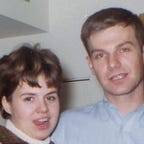Throwing Like A Girl
“I’ve brought you something,” our younger daughter said as she got off the plane from the United States. In her hand was a book, a children’s picture book.
“That’s for us?”
Indeed it was: The Kid from Diamond Street: the Extraordinary Story of Baseball Legend Edith Houghton.
“Edith who?” We looked at each other blankly. “Must be fiction,” we thought.
But, no, it is fact. Edith Houghton was born in 1912 when, according to the book’s dust jacket, “girls didn’t play baseball.” We liked the implication that now, a century later, girls DO play baseball.
They do, of course, and thanks to girls like Mo’ne Davis, the Little League phenom from Philadelphia, we know they not only play, but play fabulously.
Edith Houghton could have told us that one hundred years ago.
Even before Edith came on the scene, girls were playing baseball. Jane Austen had the heroine of Northanger Abbey in a baseball game back at the end of the 18th century, after all.
They no doubt had fun playing the game, but their playing was not taken seriously by the masculine establishment. “You throw like a girl” was the nastiest comment hurled at a male player of any age.
We discovered that chauvinist attitude at the very top of French baseball four years ago. When the Wallabies of Louviers fielded a team that included a female in regional competition, the official governing body of French baseball, the Federation Francaise de Baseball, Softball et Cricket (FFBSC) disqualified it. The Wallabies protested, but the decision to exclude females stood until the official in charge (we hardly need say the official in question was a man) left the Federation. Today more and more French teams include girls and women.
But back to Edith. There must be something in the Philadelphia air that brings out terrific female ball players, for Edith was also from Philadelphia and about the same age Mo’ne was when she burst onto the world stage in the Little League World Series.
Edith was already a pro by the time she was 10 years old. She had practically been born, she said, with a baseball in her hand, so when she heard about an all-girls baseball team called the Philadelphia Bobbies, she was determined to try out. Even at that young age, she impressed the other Bobbies, many of whom were old enough to be her mother. They put her on the roster and in no time, she became the team’s star attraction — a tiny girl who could field and throw and hit better than most adult players, male or female. Her nickname, naturally, was “the Kid.”
There was one condition she had to agree to before becoming a member of the Bobbies: she had to bob, that is, cut her hair short so that all the team members were really “bobbies.” George Steinbrenner would have been impressed. As far as Edith was concerned, as long as she could play baseball, her hair didn’t matter.
Edith went on to tour Japan with the Bobbies, and when her career with that team ended, she joined the New York Bloomer Girls and then the Boston Hollywood Girls, where she had her best year ever. She was only 19.
Even after she retired from playing, she stayed close to baseball becoming a scout for the Philadelphia Phillies, only the second woman ever to be named to that position.
Edith died just before her 101st birthday in 2013, so she didn’t get to see Mo’ne Davis’s incredible performance in Williamsburg. She would have loved it — but she wouldn’t have been surprised.
We were thrilled to be introduced to Edith by our daughter via the charming book written by Audrey Vernick and illustrated by Steven Salerno. It was published earlier this year Clarion Books, which, appropriately is a division of HOUGHTON Mifflin Harcourt (www.hmhco.com).
We wished we’d had it when our older daughter played Little League years ago and battled with the chauvinism there. She lives in Philadelphia now, so maybe she’ll feel some of the star dust that was sprinkled on those two female ballplayers there. At least both our girls will know the story of “the kid from Diamond Street” and keep working toward dreams of their own.
